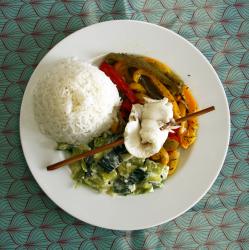In our last Cooking the conference portrait, historian of science Jean-Louis Kerouanton invites us to reflect on the “breadth of time” and to taste a deliciously lemony fish and peppers recipe. Jean-Louis is a member of the Mariano Gago Ecsite Awards jury – the first ever prize will be awarded on 11 June in Trento, during the Ecsite Annual Conference Gala Dinner.
Jean-Louis, you’re Vice-President of Nantes University (France) and a historian of science. What do your research interests cover?
I belong to the François Viète research centre that brings together colleagues from several universities in Western France, with a strong cross-disciplinary ethos. We study the epistemology and history of maths, life and space sciences, physics, chemistry, medicine and technology.
I have a specific interest in industrial heritage and harbours, as well as in digital humanities (more about this here for French speakers).
You also take part in science engagement activities with the general public…
I came to academia from the cultural sector, which is perhaps why I see public engagement as a natural part of my job. Like science centres or museums professionals, I’m convinced that learning occurs throughout your life and that one must start any engagement project by having a good look at the target audience, their interests and prior knowledge.
For instance, I recently collaborated with colleagues at the Château de Nantes to develop a digital interface bringing to life a diorama of 19th century Nantes harbour.
As a jury member for the Mariano Gago Ecsite Awards, you have now reviewed all competition entries following precise criteria. To sum up, what is your personal definition of an innovative science engagement project?
To my eyes it is fundamental to look at science and technology holistically, in their historical and social context. When interpreting industrial heritage for instance, an exhibit that solely demonstrates how a tool or machine works is incomplete in my opinion: you need to question the different uses people made or make of it. I admire interdisciplinary projects that interrogate practices and uses of technology and create new questions or meanings by doing so.
Time is often treated as a pure physics data in science centres and museums. You’re touching on a different kind of time…
As individuals, we are all part of a continuum – we build on pre-existing personal, social, and historical heritage. When looking at science and technology, you can’t ignore the breadth of time, the complexity of contexts and uses. I’m not interested in industrial heritage out of nostalgia, but because these material traces are evidence of the past events that made us the way we are today on the one hand; and building blocks for the future on the other hand.
What’s your take on “Food for curious minds”, the 2015 Ecsite conference theme?
Food is one of the major challenges for the 21st century. It’s up to us to decide how we make our food and how we use it. We have a collective responsibility in defining a balance for humanity on the planet. Is it ok to plant biofuel plant material on land previously dedicated to food production? Are there better ways than others to kill the animals we eat? Is foie gras delicious or scandalous? Why do most Westerners shy away from eating insects?
And to finish with… do you have a recipe to share with us?
Here’s a simple and delicious dish I ate recently: scabbard fish filets on a mixed peppers bed.
Ingredients
- Scabbard fish filets (approx. 150g per person)
- Red, yellow and green peppers
- Leeks
- Cream
- Lemon
- Rice
Preparation
Roll the fish filets and maintain them in place using wooden sticks. Cut the peppers in strips and place in an oven dish, with the filets on top.
Add lemon juice and olive oil and put in the oven (180°C) for 20-25min. You can add salt, pepper, a few herbs…
Meanwhile, chop the leeks and fry them gently in a pan. Add a little cream when they’re almost done.
Serve the fish, peppers and leeks with rice – enjoy!
Cooked at the Ecsite office by Antonina Khodzhaeva, Project Manager.



